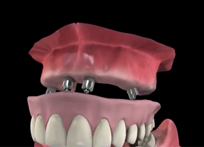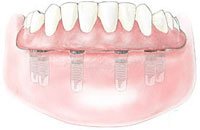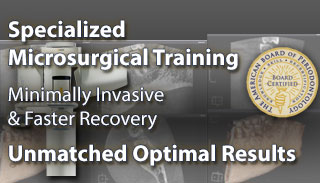
Dental Implants - Minneapolis, MN
Dental Implants Are A Permanent Tooth Replacement Option
Click Here to Schedule Your Consultation >>
 Dental implants are on the cutting-edge of tooth replacement technology. Dr. Sanchez is dedicated to providing each patient with the optimal solution to their dental health challenge, which is why he often recommends this procedure.
Dental implants are on the cutting-edge of tooth replacement technology. Dr. Sanchez is dedicated to providing each patient with the optimal solution to their dental health challenge, which is why he often recommends this procedure.
He understands that losing teeth can be a traumatic experience, so his focus is on replacing those teeth with proven, minimally-invasive techniques that allow his patients to regain maximum use of their teeth while maintaining jaw strength, a natural appearance, and restored function.
New Teeth in 1 Day with Full Mouth Dental Implants
 Full Mouth Implant ProcedureThis treatment concept is a revolutionary new procedure that provides patients permanent attached (fixed) teeth using as little as four implants. Dr. Sanchez has advanced training in the same day implant procedure and will often recommend it for patients that are about to lose or have lost all of their upper and/or lower teeth.
Full Mouth Implant ProcedureThis treatment concept is a revolutionary new procedure that provides patients permanent attached (fixed) teeth using as little as four implants. Dr. Sanchez has advanced training in the same day implant procedure and will often recommend it for patients that are about to lose or have lost all of their upper and/or lower teeth.
Learn more about Teeth in a Day with Full Mouth Implants>>
Replacing a Single Missing Tooth
 Implant Placement Into SocketA natural tooth is anchored into the jawbone by its tooth root. Tooth roots attach firmly to the jawbone and keep your teeth stable when chewing solid foods.
Implant Placement Into SocketA natural tooth is anchored into the jawbone by its tooth root. Tooth roots attach firmly to the jawbone and keep your teeth stable when chewing solid foods.
Traditionally, if you were missing a tooth or if one needed to be extracted, the healthy teeth on either side of the missing tooth would be cut down and replaced with a "bridge".
What Are Dental Implants?
Dental implants are the modern alternative. Instead of cutting down two perfectly healthy teeth, Dr. Sanchez inserts an implant into the jawbone to replace your missing tooth root. The implant becomes solidly fixed into your jaw bone (osseointegration). A crown is then placed onto this artificial tooth root that looks, feels, and functions like your natural tooth.
Quite simply, dental implants are the most natural replacement for missing teeth.
Replacing Several Missing Teeth
Traditionally, several missing teeth would have been replaced with a removable partial or full denture.
Dentures have to be taken out and soaked at night. During the day, they can also look unnatural and rub causing pain. Dentures and partials make it difficult or impossible to eat certain foods.
 Implants can now be used to anchor partial or full dentures. This prevents the slipping, irritation, and pain associated with "floating" partials and dentures. It also prevents the tedious removal of dentures for overnight soaking and cleaning. Implants also eliminate the need for denture adhesives. This allows you to enjoy eating the foods you previously avoided. With tooth implants, your partials or dentures are firmly anchored to the jawbone, allowing them to feel much more like natural teeth.
Implants can now be used to anchor partial or full dentures. This prevents the slipping, irritation, and pain associated with "floating" partials and dentures. It also prevents the tedious removal of dentures for overnight soaking and cleaning. Implants also eliminate the need for denture adhesives. This allows you to enjoy eating the foods you previously avoided. With tooth implants, your partials or dentures are firmly anchored to the jawbone, allowing them to feel much more like natural teeth.
Natural tooth roots and implant posts are fixed firmly in your jawbone. When you chew, these tooth roots and posts stimulate the jawbone and prevent it from shrinking. You may have seen a person who looked prematurely old because their jawbone had shrunk after wearing floating dentures. Dental implants help preserve your jawbone and appearance.
Advanced Dental Imaging for Success
 The key to implant safety and success is advanced radiography. A CT scan ensures that every possible precaution has been made to reduce the risk of involvement of the nerves in the lower jaw, and the sinuses and nose in the upper jaw. This helps to reduce chair time and the possibility of complications. Until recently, CT scans were only done in hospitals or medical facilities.
The key to implant safety and success is advanced radiography. A CT scan ensures that every possible precaution has been made to reduce the risk of involvement of the nerves in the lower jaw, and the sinuses and nose in the upper jaw. This helps to reduce chair time and the possibility of complications. Until recently, CT scans were only done in hospitals or medical facilities.

The Success Rate of Dental Implants
After their healing period, the success rate of tooth implant is between 94% and 98%. If you are a non-smoker with good oral hygiene and keep your periodontal maintenance appointments, the percentage is closer to 98%.
Does the Procedure Hurt?
The discomfort involved with receiving a tooth implant is similar to that of having a cavity filled. It is done under local anesthesia and patients generally experience little discomfort after the procedure.
How Long Will Dental Implants Last?
Dental implants become fixed to the jawbone. Though the life span of a implant will vary with each patient, many have lasted for more than 50 years. With good oral hygiene and regular cleanings, implants should last a lifetime. In contrast, the average life span of a traditional fixed bridge is between 10-15 years.
Bone Regeneration
A critical question in determining whether an implant can be placed is, "Is there enough bone to support the implant?" Fortunately, advanced bone regeneration techniques now make it possible to place many more implants than just 10 years ago. For more information on bone regeneration, please see the animation on Bone Grafting.
Am I a Candidate for Dental Implants?
Tooth implant treatment begins with an evaluation to determine if you are a good candidate for this procedure. Please contact the office for an examination and consultation. We look forward to hearing from you.
For More Information
The following sites will provide you with more information:
- MissingTeeth.org
Website for the Institute for Dental Implant Awareness (IDIA). - Academy of Osseointegration
- American Academy of Periodontology Article:
Dental Implants: Teeth That Look and Feel Like Your Own
Looking into ClearChoice, Full Mouth Implants, Teeth-In-A-Day or TeethXPress? Dr. Sanchez is a Diplomate of the American Board of Periodontics and is an expert at placing dental implants in Minneapolis, MN. Call today for an expert consultation!









